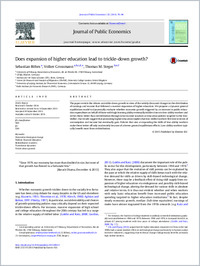Does expansion of higher education lead to trickle-down growth?
BP2-STS
- Böhm, Sebastian University of Fribourg
- Grossmann, Volker ORCID University of Fribourg, CESifo, IZA, CReAM
- Steger, Thomas M. University of Leipzig, CESifo, IWH
- 2015
Published in:
- Journal of Public Economics. - Elsevier BV. - 2015, vol. 132, p. 79-94
Directed technological change
Publicly financed education
Redistributive transfers
Transitional dynamics
Trickle-down growth
English
The paper revisits the debate on trickle-down growth in view of the widely discussed changes in the distribution of earnings and income that followed a massive expansion of higher education. We propose a dynamic general equilibrium model to dynamically evaluate whether economic growth triggered by an increase in public education expenditure on behalf of those with high learning ability eventually trickles down to low-ability workers and serves them better than redistribution through labor income taxation or education policies targeted to the low-skilled. Our results suggest that promoting higher education implies that low-skilled workers first lose in terms of consumption and income but eventually gain. Policies that aim at expanding the skills of low-ability workers make them better off only moderately because of adverse general equilibrium effects. Low-ability workers typically benefit most from redistribution.
- Faculty
- Faculté des sciences économiques et sociales et du management
- Department
- Département d'économie politique
- Language
-
- English
- Classification
- Economics
- License
- Rights reserved
- Open access status
- green
- Identifiers
-
- DOI 10.1016/j.jpubeco.2015.09.011
- ISSN 0047-2727
- Persistent URL
- https://folia.unifr.ch/unifr/documents/322927
Statistics
Document views: 37
File downloads:
- 1-s2.0-s0047272715001681-main.pdf: 140
